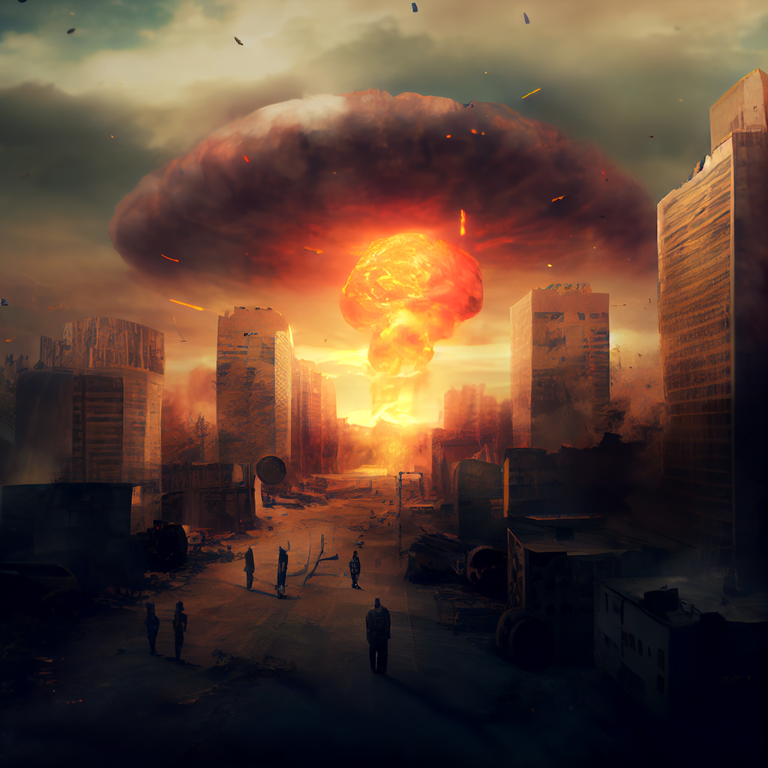
What tends to follow major economic events? War.
History has shown that economic slowdowns and recessions tend to lead to war or conflict. The Second World War was followed by the Great Depression of 1929-1939. The 1973–1975 recession was partly caused by the Vietnam war and the 1973 oil crisis due to the Yom Kippur War. The early 1990's recession resulted in an Iraq war.
Despite Russia attacking Ukraine since the start of 2022 almost, things have been relatively calm. While the West and other nations assist Ukraine in their defence against Russia (rather successfully, I might add), we have seen immense global instability.
Just when you thought the lockdowns, the mandates, and emergency legislation designed to keep us in our homes and force us to vaccinate was one of the worse things to happen for two years, Russia upped the ante.
After trillions were collectively pumped into global economies during the pandemic to try and avoid the collapse of local economies, people had more money to spend. Interest rates were low, so money was cheap, and the cheap money tap flowed and flowed until the streets were drowning in cheap money.
Due to the just-in-time nature of global supply chains that rely on continents like Asia for manufacturing and distribution, something even worse happened. When China pursued its COVID-zero strategy (it still is), factories and ports were shut down. These factories and ports were responsible for raw materials like plastic and electronics.
We then saw the price of new cars start to jump. We saw historic drought conditions in Taiwan and other parts of Asia result in over 50% of chip capacity being lost. Power blackouts, lack of sand needed for chips, lack of water to produce them. This was another death knell for the economy, one that would take a few months for people to feel the effects of and years to fix.
When Russia invaded Ukraine, we saw the price of gas jump. Even Australia, the world's largest gas producer, was affected due to a lack of domestic gas reservation policy (unless you live in one specific state). This, in turn, had a knock-on effect on factories and energy producers that rely on gas.
When coal isn't available in Australia, gas-powered turbines fill the void. The gas price went ballistic, and the electricity spot price went up hundreds of a percent. The electricity market regulator had to step in and take control of energy production briefly due to the price situation.
Food producers, material producers, and everyone were anxious about the gas situation. It turns out that gas is used by companies that manufacture goods. While many companies were on fixed-price gas contracts, they paid a lot more as they started to expire. This had the flow-on effect of increasing the price of goods, contributing to inflation.
Long story short, the conflict in Ukraine has been going on for a while now. Things have been somewhat stable. The gas market was starting to stabilise, and the cost of grain was coming down.
Then, something happened. There have been reports that Russian missiles may have struck a part of Poland. Killing two people. While the death count may not prompt a retaliatory response from Poland and other NATO nations under Article 5, that's not to say that it couldn't.
Warsaw has thus far only spoken of Article 4, which allows any member to call for urgent consultations with the North Atlantic council.
The Russian Defence Ministry has denied that several missiles intended for Ukraine have crossed into Poland. Claiming the reports are "deliberate provocation" — words from the same country that amassed a bunch of military equipment and troops on the Ukrainian border and then said they weren't going to invade Ukraine and people were making it up.
US intelligence has revealed that an unknown number of missiles struck a farm in the polish village of Przewodów and killed two people. "We are looking into these reports and closely coordinating with our Ally Poland," a NATO official said.
It seemed all but inevitable that there would be collateral damage. Fortunately, however unfortunate, only two lives have allegedly been lost. So, if Russia is responsible, it might not warrant a response from NATO. Still, it will put NATO and its members on high alert, possibly even worse sanctions for Russia (already crippled with sanctions).
We are returning to what we spoke about at the beginning of this article. The world is currently on the edge of a recession. It is predicted that Australia, the US and UK will enter a recession in 2023. And what has history shown us? Large-scale economic events can lead to war. And to see who profits from wars, you only have to look to companies like Lockheed & Martin and numerous private military-affiliated companies that provide the means for countries to go to war, particularly in the West.
If this latest Poland incident doesn't cause a war, we can't be too far away from another incident, whether false flag, planned or accidental.
Congratulations @beggars! You have completed the following achievement on the Hive blockchain and have been rewarded with new badge(s):
Your next target is to reach 2000 replies.
You can view your badges on your board and compare yourself to others in the Ranking
If you no longer want to receive notifications, reply to this comment with the word
STOPCheck out the last post from @hivebuzz:
Support the HiveBuzz project. Vote for our proposal!